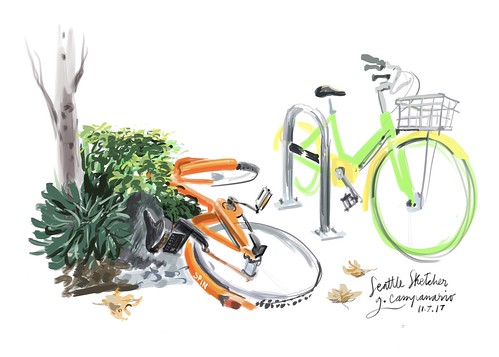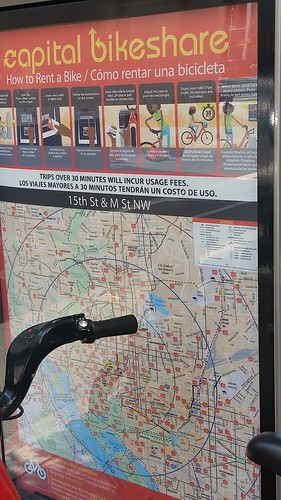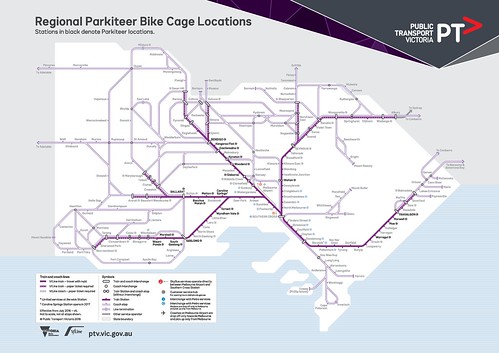Maybe New York City just needs to invest in public secure bike parking (re: dockless bike sharing)
 Crain's New York Business reports ("12 bike-share companies bid to serve non–Citi Bike neighborhoods: City unveils list of dockless operators vying for pilot program") that many firms are bidding to offer dockless bike share--big known firms and small ones too (including one from this area).
Crain's New York Business reports ("12 bike-share companies bid to serve non–Citi Bike neighborhoods: City unveils list of dockless operators vying for pilot program") that many firms are bidding to offer dockless bike share--big known firms and small ones too (including one from this area).I don't really understand the business model for dockless bike share. I mean I do. If you can get someone to pay $1/ride 4x/day that's $120/month from one user. If you can get four people per bike, that's $480/month. The bikes don't cost that much, etc.
Depending on the nature of where you conduct most of your trips, bike share can make a lot of sense in terms of offloading the cost of owning a bike in terms of maintenance, security, and storage. That's easily worth the $75 to $150/year it costs to use bike share in major cities.
But charging 5x or more than traditional bike share for the privilege of making money for the corporation owning the system, that I don't understand.
Suzanne coined the term "paying for the process."
 The reason that governments are receptive is because unlike traditional bike share, companies, at least at this stage of the venture capital and business development process, are willing and eager to bear all the costs, so the cities don't have to spend any money on it.
The reason that governments are receptive is because unlike traditional bike share, companies, at least at this stage of the venture capital and business development process, are willing and eager to bear all the costs, so the cities don't have to spend any money on it. They can feel good about it, so long as they don't ask the question whether or not it's a good deal for the user. (Not having to pay for anything is why universities are interested.)
But the mistake is believing that the reason that people aren't biking for transportation is because of lack of access to bikes.
Sure, many people don't own bikes, but they could if they were motivated to do so. Access isn't the issue, it's willingness to bike for transportation on an almost daily basis.
In the US, with a land use and mobility planning paradigm firmly centered upon automobility most people look at bikes as toys and riding them as strictly recreational.
Even with dockless, my sense is that most of the users are "casual" users not regular cyclists, and many of the rides are recreational.
That's fine--recreational riding--but is it enough to build a successful business around it? Probably not.
You just don't see that many people biking to make sense of there being multiple competitive services for dockless bike share.
It reminds me more of the "gold rush" days at the start of the creation of railroads or interurbans--many competitive systems were announced, but most failed, and those systems that had at least some track either were abandoned or consolidated.
 New Capital Bikeshare map kiosk shows bikesheds in 5 minute increments, and pictograms about the process
New Capital Bikeshare map kiosk shows bikesheds in 5 minute increments, and pictograms about the processBut if many of your trips are outside of the bikeshare mobility shed, it makes sense to have your own bike.
Hell, a couple weeks ago I bought a used bike for $100 and he included a helmet, lock, and basket.
Still, it's possible to buy a new bike for less than $400 (some credit unions even provide loans) and the cost to maintain a bike is probably about $150/year, more if you get a lot of flat tires.
I mention bike parking because no community in the US has a network of secure bike parking comparable to the Parkiteer network in Greater Melbourne.
Probably if NYC focused on creating high quality bike parking, using models from the Netherlands--of secure, indoor, often underground parking-- so that the costs to store and secure bikes are lower, more people might consider biking for transportation on a regular basis.
-- "New bike parking facility at Maastricht train station in the Netherlands reminds me of the need to create high profile bike hubs in the US"

So far there are more than 100 Parkiteer bike cages operational, with more added eacy year.
===
Last week, Uber bought Jump, the e-bike dockless startup for $100 million. Given that the bikes alone cost $24 million (12,000 bikes @ $2,000) that's a decent return for the creators.
Note that the Transit Cooperative Research Program just released a report on Public Transit and Bike Sharing (registration required to download).
Labels: bicycle and pedestrian planning, bicycle parking, bicycle sharing, transportation planning, urban design/placemaking



3 Comments:
https://www.americaninno.com/dc/inno-news-dc/dockless-bikes-keep-teaming-up-with-ride-hailing-services-the-latest-mobike-and-via/
This new bundle provides a pass to use Via, a "shared taxi fixed route service" and Mobike dockless bike sharing.
I have a bike but still find myself using dockless bikeshare from time to time for one-way trips (e.g., walking or taking transit for another leg of the trip).
This is equivalent to how people who own cars will sometimes take a taxi. Sure, not many people commute by taxi every day, but it's still a viable business (or used to be).
Agreed. But I can't see how you can make a profitable business out of such microsegments as this one, occasional recreational users, etc.
... taxis are "viable" because they tend to rely on labor that has limited choices and therefore can accept the constraints of poor hours, long hours, and poor pay.
Ride hailing is different because as late entrants they have newer investments, and venture capital subsidizes fares so that they are lower than they would be if they were required to be profitable taking the costs of both capital and operations into account.
Post a Comment
<< Home